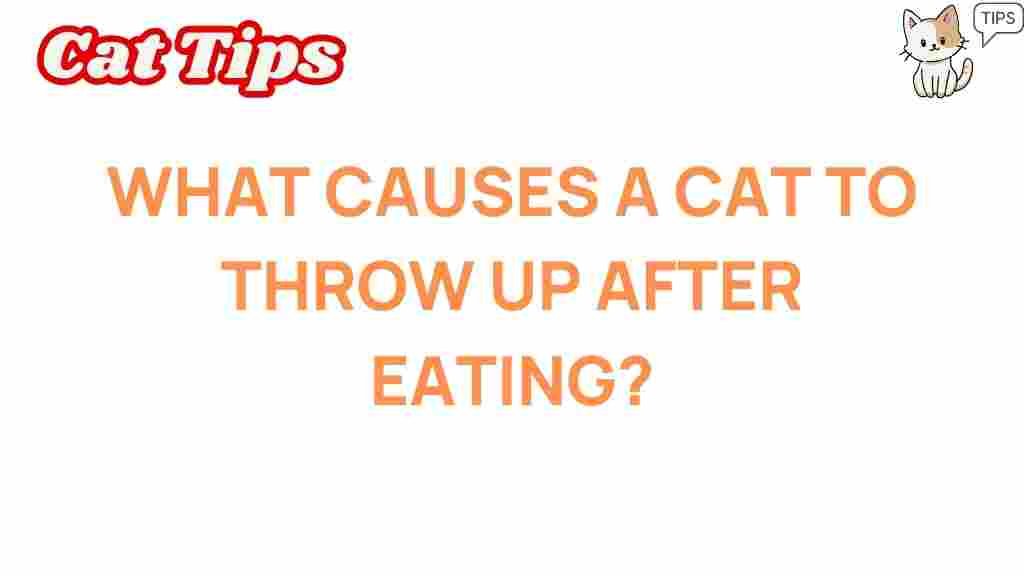Understanding Cat Health: Why Do Cats Vomit After Eating?
As a cat owner, witnessing your beloved feline companion vomit can be alarming. While occasional vomiting may be normal, frequent occurrences raise concerns about your cat’s health. Understanding why cats vomit after eating is crucial for ensuring optimal cat health. In this article, we will unravel the mystery behind this common issue, providing insights into potential causes, prevention strategies, and when to seek veterinary help.
Common Causes of Vomiting in Cats
There are numerous reasons why cats may vomit after eating. Here are some of the most common causes:
- Eating Too Quickly: Cats that eat too fast may gulp air with their food, leading to vomiting.
- Dietary Changes: Sudden changes in diet can upset a cat’s stomach, resulting in vomiting.
- Hairballs: Cats groom themselves and ingest hair, which can accumulate and cause vomiting.
- Food Intolerance: Some cats may react negatively to specific ingredients in their food.
- Infections: Viral or bacterial infections can irritate the stomach lining.
- Parasites: Intestinal parasites can lead to gastrointestinal upset and vomiting.
- Underlying Health Issues: Conditions such as kidney disease, hyperthyroidism, or tumors can cause vomiting.
Step-by-Step Process: Identifying the Cause
To effectively address the issue of vomiting in your cat, follow this systematic approach:
- Observe the Frequency: Take note of how often your cat vomits. Is it a one-time occurrence or does it happen regularly?
- Check the Vomit: Look for signs of hair, food, or other unusual substances in the vomit.
- Monitor Behavior: Pay attention to any changes in your cat’s behavior, such as lethargy, loss of appetite, or hiding.
- Review Diet: Consider if you have recently changed your cat’s food or if they have had access to human food.
- Consult with a Veterinarian: If vomiting persists, consult your vet for a thorough examination and diagnosis.
Preventive Measures for Cat Health
Preventing vomiting in cats often involves making small changes to their diet and eating habits. Here are some effective strategies:
- Slow Feeding: Use puzzle feeders or slow-feeding bowls to help your cat eat at a more controlled pace.
- Gradual Diet Changes: Introduce any new food gradually over several days to avoid stomach upset.
- Regular Grooming: Regularly brush your cat to reduce the amount of hair they ingest, minimizing hairballs.
- High-Quality Diet: Feed your cat a balanced diet that is appropriate for their age, weight, and health needs.
- Hydration: Ensure your cat has access to fresh water, as dehydration can exacerbate vomiting.
Troubleshooting Tips for Cat Owners
If your cat continues to vomit despite taking preventive measures, consider the following troubleshooting tips:
- Keep a Food Diary: Document what your cat eats and any vomiting episodes to identify possible triggers.
- Limit Treats: Reduce the number of treats given to your cat, especially rich or fatty ones that can upset their stomach.
- Check for Foreign Objects: Ensure your cat hasn’t ingested any non-food items, which could cause gastrointestinal blockages.
- Evaluate Stress Levels: Stress can contribute to vomiting. Create a calm environment for your cat.
- Regular Vet Check-ups: Schedule routine veterinary visits to monitor your cat’s overall health and catch issues early.
When to Seek Veterinary Help
While occasional vomiting may not be a cause for concern, you should consult your veterinarian if:
- The vomiting persists for more than 24 hours.
- Your cat appears lethargic or shows signs of distress.
- There is blood in the vomit or if the vomit has a coffee grounds appearance.
- Your cat is experiencing diarrhea or other gastrointestinal symptoms.
- Your cat is losing weight or has a decrease in appetite.
Prompt veterinary attention can prevent more serious health issues and ensure your cat remains healthy and happy.
Conclusion: Prioritizing Cat Health
Understanding why cats vomit after eating is essential for every cat owner. By being proactive and observant, you can help maintain your cat’s cat health. Implementing preventive measures, troubleshooting potential issues, and knowing when to seek professional help are all crucial steps in addressing vomiting in cats. Remember, your veterinarian is your best resource when it comes to your cat’s health. For further information on maintaining your cat’s health, consider exploring resources like the ASPCA website or check out our pet care blog for tips and advice.
This article is in the category Health and created by CatTips Team
